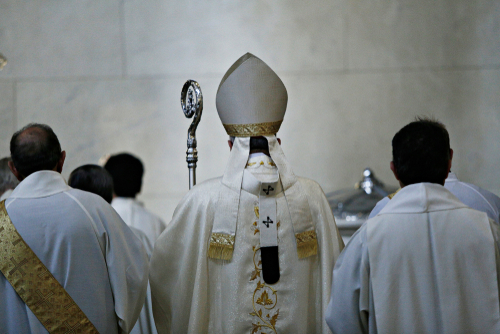Church Sexual Abuse |
A church or place of worship should be a safe place—a place of faith, love, and acceptance. Unfortunately, some church clergy, priests, volunteers, and leaders destroy this sacred environment by sexually abusing innocent children.
For years, church leaders have denied allegations of church sexual abuse, while innocent child victims grew up into adulthoods plagued by the side effects of that abuse. If you or your child have been sexually abused by clergy, there are multiple legal angles to pursue when it comes to who to sue for sexual abuse in the Catholic Church. It’s never too late to report the abuse and get help.
Statistics Regarding Church
Sexual Abuse in California
Most victims of sexual abuse suffer in silence for years and very few ever report what happened to them.
When it comes to church sexual abuse in California, here is what we know:
- The California Church has openly admitted to at least 500 abusers and 1,100 victims.
- California newspapers ran 2,000 stories of church sexual abuse in half a year’s time.
- California church sex abuse investigations rose from 119,000 in 1976 to 475,000 in 1988.
- The Archdiocese of Los Angeles listed 323 clerics accused of sexual abuse.
- In San Francisco Bay, at least 263 priests were accused of sexual abuse.
- In Oakland, there have been 45 verified accounts of priest sexual abuse.
- The San Francisco Archdiocese has paid over $87.2 million in 125 settlements.
In some cases, California law protects your right to file as a “Jane or John Doe.” This can keep your identity private, while still allowing you to pursue justice. Contact us to discreetly discuss your case.
California Laws Pertaining to Sexual Abuse in the Church
If you plan on pressing criminal charges, there are a number of laws in California regarding sexual violence, including:
- PC 243.4 Sexual Battery: Any person who touches an intimate part of another person while that person is unlawfully restrained by the accused or an accomplice, and if the touching is against the will of the person touched and is for the purpose of sexual arousal, sexual gratification, or sexual abuse, is guilty of sexual battery.
- PC 261.5 Statutory Rape: Unlawful sexual intercourse is an act of sexual intercourse accomplished with a person who is not the spouse of the perpetrator, if the person is a minor. For the purposes of this section, a “minor” is a person under the age of 18 years and an “adult” is a person who is at least 18 years of age.
- PC 288.5 Continuous Sexual Abuse of a Child: Any person who either resides in the same home with the minor child or has recurring access to the child, who over a period of time, not less than three months in duration, engages in three or more acts of substantial sexual conduct with a child under the age of 14 years at the time of the commission of the offense, or three or more acts of lewd or lascivious conduct, is guilty of the offense of continuous sexual abuse of a child and shall be punished by imprisonment in the state prison for a term of 6, 12, or 16 years.
- PC 288.7 Sex With a Child Under 10: Any person 18 years of age or older who engages in sexual intercourse or sodomy with a child who is 10 years of age or younger is guilty of a felony and shall be punished by imprisonment in the state prison for a term of 25 years to life.
- PC 647.6 Annoying or Molesting a Child Under 18: Every person who annoys or molests any child under 18 years of age shall be punished by a fine not exceeding five thousand dollars ($5,000), by imprisonment in a county jail not exceeding one year, or by both the fine and imprisonment.
Other laws have been used to hold church organizations responsible for sexual abuse include:
- Racketeering / Control of Profits of Organized Crime Act [PC 186.2]: Property is subject to forfeiture when a person has engaged in a pattern of criminal activity intended for financial gain, or when a person received property through criminal profiteering activities.
- Public Nuisance [PC 372 and 373a]: In California, a “nuisance” is something that is injurious to health, indecent, offensive to the senses, or an obstruction to the free use of public property. Nuisances interfere with the comfortable enjoyment of life or property among members of the community. It is a crime to commit a public nuisance, fail to perform a duty to remove a public nuisance, or to allow a public nuisance to remain on your property.
- Consumer Protection / Consumer Legal Remedies Act [Cal. Civ Code 1750]: In West Virginia, a new legal angle has been tried, which charges church officials with failure to conduct proper background checks and warn parents of known risks—particularly in Catholic schools, where repeated abuses have occurred. In California, consumer protection laws make it a crime to engage in “methods of competition and unfair or deceptive acts that result in the sale of goods or services to a consumer.”
The following law paves the way for third-party liability in civil court:
- CANRA, the Civil Abuse and Neglect Reporting Act [Cal. Civ Code 11164-11174.3]: State professionals who work with children—including church volunteers and clergy—are mandated to file a report with the police or state welfare agency within 36 hours if they know about or suspect child abuse. The one exception is when a person confesses child sexual abuse to a priest, although proposed legislative action would eliminate that loophole.
Lewis & Llewellyn may be able to build a substantial case for you were a victim of church sexual abuse as a result of a religious organization’s negligence. Contact us for free.
Who Can Be Held Liable for Church Sexual Abuse in Civil Court?
The perpetrator of abuse is the most obvious target in criminal court. If the District Attorney is successful in proving that the abuser has committed a crime “against the state,” then the defendant may be sentenced to jail, probation, fined with reparations payable to the state government, or placed on a sex offender registry.
Along with pressing criminal charges, you may also pursue a civil lawsuit against the abuser, which can result in compensation paid to you for medical expenses, loss of wages or lost earning capacity, and mental pain, suffering, and distress.
Beyond suing the perpetrator of abuse, civil courts allow for an expanded scope of liability that, in cases of church sexual abuse, could include:
- Church administrators and mandated reporters for their role in allowing a known perpetrator continued access to children; for failing to report child abuse to the proper authorities; failing to take corrective action; moving priests around without telling parishes about past incidents; and for trying to cover up the abuse.
- The bishop for knowingly employing a pedophile into a position of power where working with children is inevitable.
- The diocese for hiding records of child abuse from the public, failing to report abuse to authorities, and failing to remove known offenders from office.
- The Pope and the Vatican for failing to take corrective action, failing to develop policies and procedures that would prevent child abuse, and failing to report offenders to authorities or aid in investigations.

Though a case can be made for liability, it is not an easy battle—particularly the higher up in the chain of command you go. The Vatican, for instance, has been sued a number of times but has never been held liable for sexual abuse. However, including them as a party in these lawsuits is significant in that it has placed considerable pressure on the Pope to publicly address these concerns and make it a priority to develop new policies and procedures aimed at preventing future abuses from occurring.
For cases where the perpetrators of sexual abuse are too impoverished to pay damages or have long since died, suing the diocese can be a glimmer of hope for adult survivors in need of compensation for personal damages. California attorneys have been successful in taking on church administrators, who have invested in large insurance policies, to obtain hundreds of thousands, and even millions, of dollars for their clients. In San Francisco alone, the Catholic Church has already paid out more than $87 million in settlements.
The Statute of Limitations for Cases of Church Sexual Abuse

The statute of limitations for cases of sexual abuse varies by type of abuse and whether or not you’re pressing criminal charges or filing a civil lawsuit.
If you wish to press criminal charges against the priest who abused you—ideally leading to prison time—then you must proceed through criminal court. California law allows up to one year from the date you reported the incident to authorities for the District Attorney to file charges, no matter how long ago the abuse actually occurred.
For civil court, minors generally have until age 26 to pursue a civil lawsuit against the perpetrator and any responsible parties. You may sue in civil court even if the perpetrator was never brought up on criminal charges, or if the criminal trial failed.
When your case falls outside the standard statute of limitations, the “discovery rule” may apply. This rule allows a plaintiff to sue “within three years of realization of harm,” regardless of when that occurs.
Lewis & Llewellyn Case Results
Large organizations may try to shield themselves from liability but the experienced civil attorneys at Lewis & Llewellyn have what is required to prevail in a civil lawsuit against a powerful and well-funded institution such as the Roman Catholic Church.
Contact Experienced Church Sexual Abuse Attorneys in San Francisco
Criminal lawsuits may only hold a single person accountable for an act of sexual abuse, but civil law allows for many others to be held responsible. There are many different law doctrines attorneys can pursue to hold leaders in the church, as well as larger organizations, accountable for their actions and inactions. For this reason, it is imperative that you find a law firm with particular expertise in litigating sexual abuse cases relative to the church. An experienced sexual abuse attorney will know exactly who to sue for sexual abuse in the Catholic Church.
Whether you’re advocating for your child or are an adult seeking closure for abuse suffered years ago, Lewis & Llewellyn has the experience, grit, and compassion to help you obtain justice and maximum compensation. Contact our team online for support and guidance to see you through this emotional time, or call +1 (415) 800-0590 to schedule an appointment with an advocate today.
Did you know there are no upfront costs with Lewis & Llewellyn?
Every case review and consultation is free. Should we decide to take on your case, you will sign a contract defining payment, but no money is collected. Any fees required are factored into the settlement or compensation amount.
You have nothing to lose and everything to gain from speaking with an experienced attorney regarding your legal options.
DISCLAIMER: The information in this blog is provided for general informational purposes only, and may not reflect the current law in your jurisdiction. No information contained in this blog or on this website should be construed as legal advice from Lewis & Llewellyn LLP. Neither your receipt of information from this website, nor your use of this website to contact Lewis & Llewellyn LLP creates an attorney-client relationship between you and the firm or any of its lawyers. No reader of this website should act or refrain from acting on the basis of any information included in, or accessible through, this website without seeking the appropriate legal advice on the particular facts and circumstances at issue from a lawyer licensed in the recipient’s jurisdiction.


